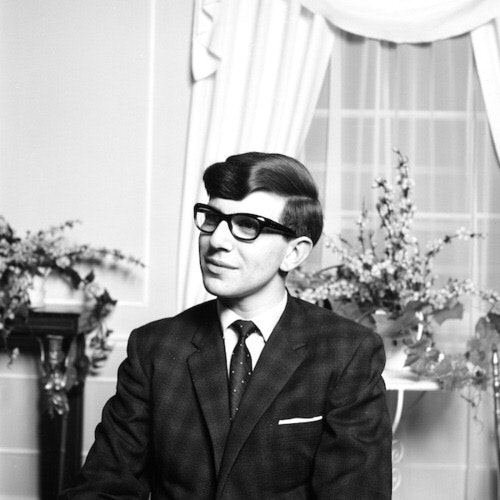The Life and Brilliance: Stephen Hawking

Hawking in the 60’s.
April 12, 2018
Stephen Hawking, regarded as one of the most brilliant theoretical physicists, passed away on Wednesday, March 14th at the age of 76. Hawking, born on the 8th of January, 1942 in England, he attended the University of Oxford studying physics. While his father urging young Hawking to study medicine, he instead went to study cosmology, the study of the universe.
In 1963, Hawking got diagnosed with Lou Gehrig’s disease (then known as motor neuron disease). Hawking was not expected to live more than two years, but he defied all odds. He acquired a Ph.D. and created new roads to understanding the universe.
He continued at Cambridge after his graduation, and in 1974, he was inducted into the Royal Society. In 1979, he was the Lucasian Professor of Mathematics at Cambridge. Hawking studied basic laws of the universe, studying the Big Bang Theory, boasting that the universe has a beginning, it will most likely have an ending.
As a popular cosmologist, he was also a popular author, writing titles such as “A Brief History of Time,” “The Universe in a Nutshell,” “The Grand Design,” and “On the Shoulders of Giants.” Hawking also appeared in numerous television shows such as “The Simpsons,” “The Big Bang Theory,” and “Star Trek.”
In 2014, there was an autobiographical movie released about his life entitled “The Theory of Everything.” The movie followed Hawking through his life, his accomplishments and the progression of ALS. In the box office, the movie grossed a total of $123.7 million in the U.S, and 3.75 Euros in the U.K. . Many people are affected by this loss. Some science teachers at Riverside Brookfield High School, like Lori Sullivan, talk their opinions about Mr. Hawking.
“I feel he was on par with Einstein…his book (A Brief History of Time), talked to people who weren’t scientists, but still they understood it,” said Sullivan.
Christy Hughes, a chemistry teacher, remembers Stephen Hawking.
“His quotes, the type of person he was, and his philosophy, one of most brilliant minds,” said Hughes. “His science background has affected, the more he discovered, the less we know, the knowledge is broadening.”


